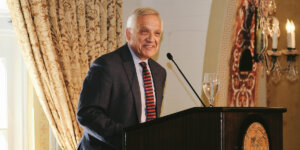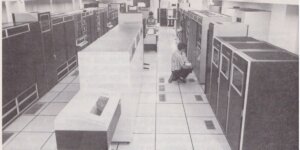
Paul Mockapetris, inventor of the DNS, at ISI’s 50th anniversary celebration. Photo Credit: USC/ISI
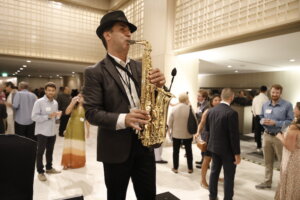
Live music during cocktail hour
On a beautiful September night in Los Angeles, partygoers enjoyed a red carpet, a step and repeat complete with photogs, live music and towers of charcuterie. Emmy’s party? No, this was a celebration of USC’s Information Sciences Institute’s (ISI) 50th anniversary, held at the Fairmont Century Plaza on September 11, 2022. . The event, which included the screening of a documentary, dinner and several speeches, looked back at ISI’s impressive history, as well as forward to the next 50 years and beyond.
Upon entering the venue, guests mingled and enjoyed a lively cocktail hour. With a saxophonist playing and appetizers circulating, ISIers past and present chatted it up and hit the open bar. Many popped by the photo booth, which had fun ISI-specific props – signs that said “ARPAnet” or “Cyber Security” (definitely not an Emmy’s party!).
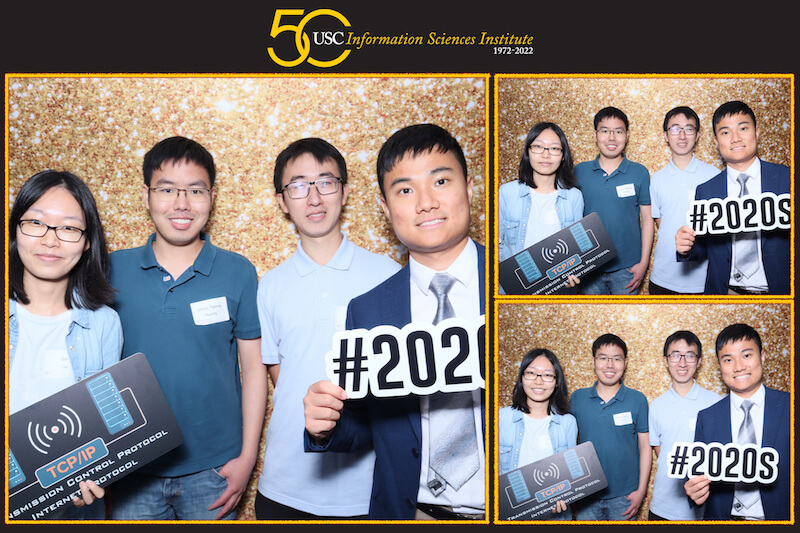
Current ISIers hit the photo booth
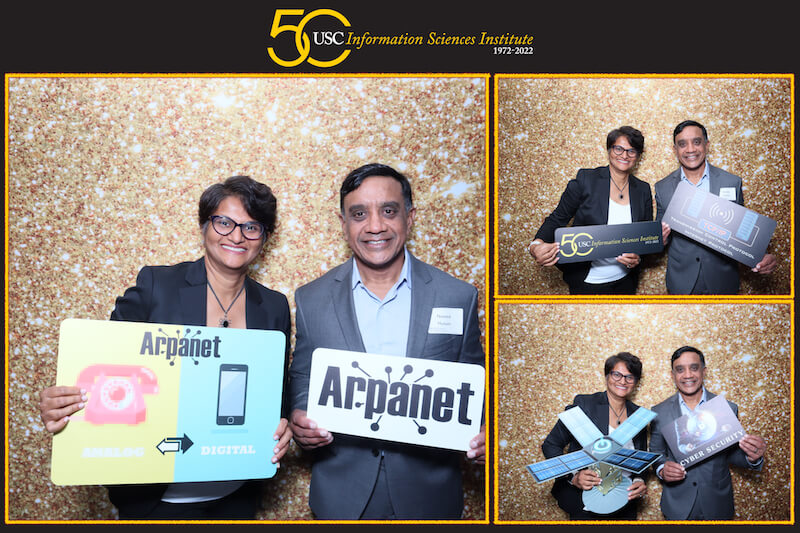
More photo booth fun for current ISIers
Cloudwalkers Premiere
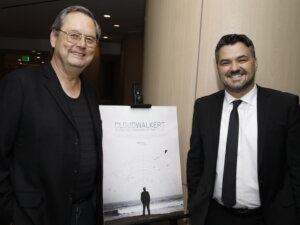
Paul Mockapetris and Daniel Druhora outside the Cloudwalkers screening
One highlight of the evening was the world premiere of Cloudwalkers: ISI and the Inventors of the Future, a documentary written and directed by Emmy award winning filmmaker Daniel Druhora. Cloudwalkers took the guests on the journey from ISI’s founding following the release of the Pentagon Papers, which prompted increased government attention on computer networking; to its role designing, developing and running the Internet, which led to one of the greatest explosion of information in human history; to the astonishing and varied work being done by ISI researchers in recent years. Among those featured were ISI co-founder Bob Balzer and inventor of the Domain Name System Paul Mockapetris, who could be seen on screen giving never-before-heard anecdotes of the early days of ISI, and were also present at the event – true ISI celebrity sightings!
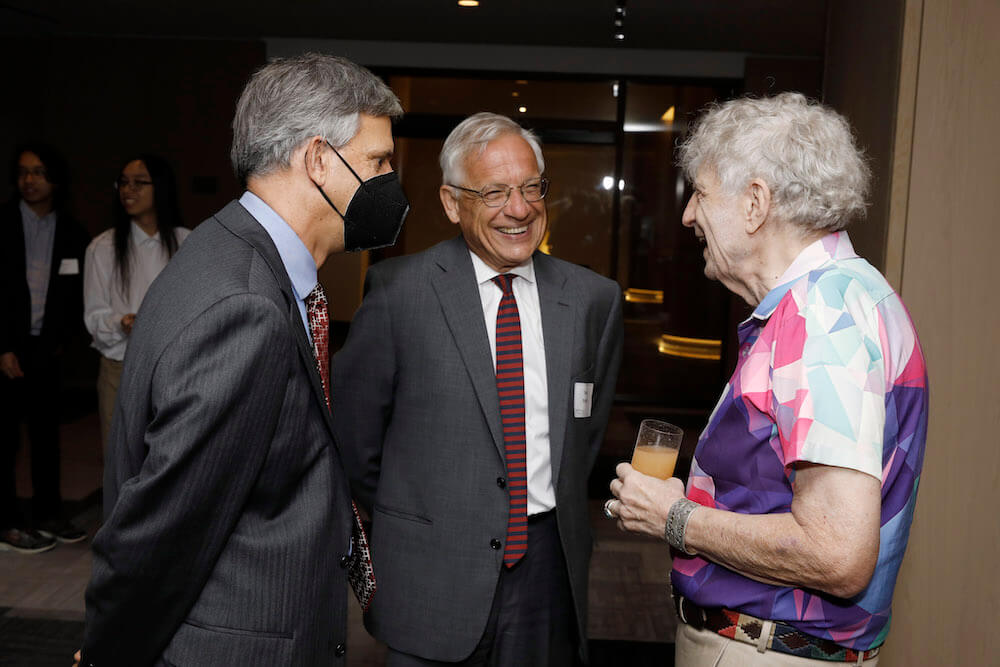
Craig Knoblock, Yannis Yortsos, and Bob Balzer
Five-Star Food in a Fancy Forest
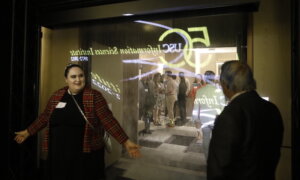
ISI PhD student Katy Felkner walking through the holographic entrance
When the party moved to the dining room, guests were guided through holographic entrances – what looked like waterfalls of fog with the ISI 50th Anniversary logo somehow emblazoned upon them. Scattered throughout the room were full-sized trees covered in lights. And at each table, a levitating centerpiece, magically (or magnetically, if you want to spoil the fun) floating amidst the wine glasses and bread baskets. The several dinner courses to follow were exceptional. A stand-out moment for many was seeing the ISI 50th Anniversary logo printed in edible gold on a piece of chocolate floating in the dessert.

A beautiful 50th anniversary tablescape
Shaping the Future of Computing Research
Keston Executive Director of ISI Craig Knoblock took the stage, giving a brief history of ISI before going into his ambitious plans for its future. “For the next 50 years, I want imagination to continue to reign at ISI. Our research must expand further, become even more collaborative with other disciplines. Think about how we could contribute to the medical field, to environmental research and more! As the size and amount of data in all disciplines continues to grow, ISI is perfectly positioned to collaborate, this is the future of computing.”

Craig Knoblock on stage and on the big screen
Getting into the specifics regarding what that means for ISI, Knoblock went on, “My goal for ISI is to continue to grow the Institute’s research funding, to double the number of faculty members and students, and to hire the supporting staff necessary to achieve this ambitious growth.” He offered powerful final words before introducing the next speaker: “We are ready to shape the future of computing research and envision making the world a better place for the next 50 years.”
“You collaborate. Collaborate. Collaborate!”
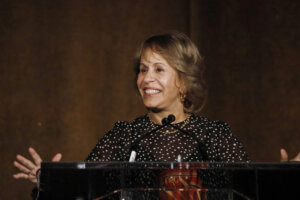
Carol Folt addressing the crowd
USC president Carol Folt delivered her own tribute to ISI, which she said holds a “central place at Viterbi [School of Engineering].” Folt continued with this astonishing fact, “about 50 percent of Viterbi’s research funding comes through ISI, and for 50 years, you’ve been mentoring computer scientists and innovators.”
She went on to talk about ISI’s success over the years, which she attributed to three things: ISI’s continued focus on the most pressing needs and opportunities; the urgency and relevance of the work done by ISI; and most importantly she said to the crowd of ISIers, “You collaborate. Collaborate. Collaborate!” She continued, “for 50 years, your collaborations have covered everything from fundamental questions to futuristic implementation. And they’ve stretched from within USC to across the world.”
Technology for the Benefit of Humanity
Next up was Yannis Yortsos, the Dean of the USC Viterbi School of Engineering, also with words of praise for the Institute: “ISI’s birth almost immediately transformed USC engineering from good to great in the realm of computing. For five decades, ISI has revolutionized computing worldwide. I believe the Institute’s best days lie ahead.”
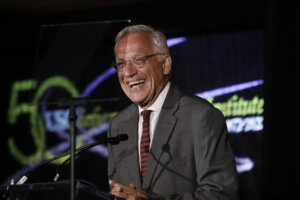
Yannis Yortsos celebrates ISI
He touched on work done by ISI that led to some of the most powerful and ubiquitous technology being used today: the internet and Zoom. And spoke of research conducted at ISI that falls into each of the four buckets of engineering activity: sustainability, health, security and the joy of living.
“Clearly, the relationship between ISI and USC Viterbi has contributed greatly to our goal of leveraging technology for the benefit of humanity.” He ended with, “I cannot wait to see all the transformative discoveries borne from this singular relationship over the next 50 years.”
Telling the Stories of the Future
The keynote speaker of the night was Ari Popper, Founder and CEO of SciFutures. With its global network of hundreds of science fiction writers, visionaries and experts, SciFutures uses storytelling to create preferred futures; accelerate innovation; rehearse the future; and transform brands, organizations and cultures.
“Stories are fundamental to who we are as a species,” he said. “They have real, practical power in terms of how we respond to the world, in changing our beliefs, motivating us to act, in healing us, and literally in changing society.”
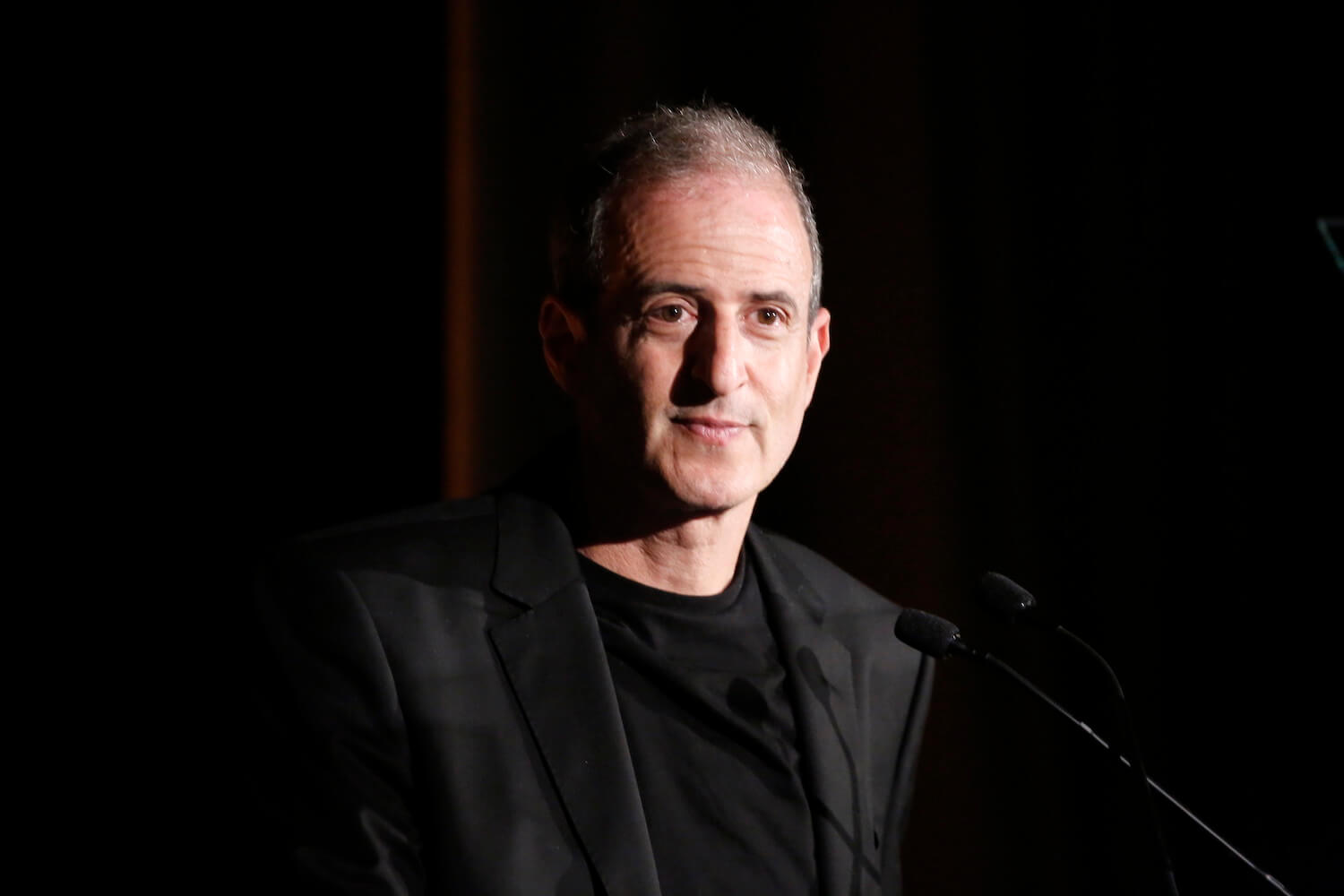
Keynote speaker Ari Popper
“And that’s just stories, what about science fiction stories?!” he proclaimed to the intrigued crowd.
Popper went on to describe what he calls passive or ambient sci fi, the sci fi that is all around us in the form of movies, graphic novels, etc. He believes this has a real influence on scientists and engineers. But Popper takes it to the next level: “What I’m trying to do is use sci fi in an active way, to deliberately use the power of story to influence and shape the future.”
In all, an interesting speech given by a person who is shaping the future with storytelling, to a group of people who are shaping the future with technology; and a fun way to wrap up a night celebrating innovation!
Published on September 19th, 2022
Last updated on September 23rd, 2022








